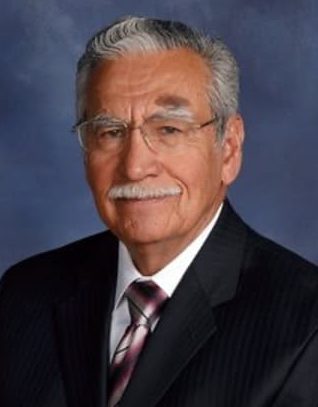Seven Directives for Effective Ministry
Every minister wants to be effective. Hence, we look for all the help we can get, even outside our field. One book that caught my attention was written at the close of the last century, “The 7 Habits of Highly Effective People,” by Stephen R. Covey (Simon and Shuster, 1989). It was of great help at that time of my ministry.
Since then, I have drawn from a source closer to home, the Epistle of 2 Timothy, where I came across these poignant words of the Apostle Paul to young Timothy, “You therefore, my son, be strong in the grace that is in Christ Jesus. The things which you have heard from me in the presence of many witnesses, entrust these to faithful men who can teach others also. Suffer hardship with me, as a good soldier of Christ Jesus. No soldier in active service entangles himself in the affairs of everyday life, so that he may please the one who enlisted him as a soldier. Also, if anyone competes as an athlete, he does not win the prize unless he competes according to the rules. The hard-working farmer ought to be the first to receive his share of the crops. Consider what I say, for the Lord will give you understanding in everything” (2 Timothy 2:1-7).
In I Timothy, Paul focuses on the structure and practice of the church (see I Timothy 3:14-16). In 2 Timothy, he focuses on the person and character of the man of God. In this paragraph, he gives Timothy seven traits that apply to every faithful steward of God’s Word and church. From these, I have drawn “The Seven Traits of Effective Ministry,” which I could easily retitle “The 7 Habits of Highly Effective Pastors.”
It is a superb paragraph, condensed into seven directives, applicable to every minister of the Gospel, illustrated by an accompanying simile or metaphor, and giving us the Biblical basis for analyzing our effectiveness in ministry. Woven in the directives is the backdrop of Paul’s personal experience, adding weight to the seriousness and effectiveness of his teaching. Scripture and experience have taught us that these seven directives either make or break the minister. Let’s examine each in order.
First Directive: Cultivate a Strong Spiritual Life
The first directive is by far the most important one: to cultivate a strong spiritual life. The Apostle Paul speaks as a father to a dear son.
Our work is spiritual and thus differs from the secular in many ways. It calls for a strong dependence on God and a cultivation of a walk with God that will enable us to face the demands of the Christian life and the Christian ministry.
Our Christian life is a life of trials and temptations against the world, the flesh, and the devil. It demands that we understand our position in the grace “that is in Christ Jesus.”
We must recognize that we are, first and foremost, sinners saved by the blood of our Lord Jesus, redeemed from our futile way of life, transformed into a child of God, and thus stand complete in Him. His grace, not the ministry, defines who we are. Scripture tells Christians to “be strong in the Lord and in the strength of His might” (Eph. 6:10) because it is a hazardous life. Hence, we are to “put on the full armor of God, so that you will be able to stand firm against the schemes of the devil” (Eph. 6:11). The Christian life demands a strong spiritual life.
The Christian ministry likewise also demands a robust spiritual life. The apostles were prevented from ministry until they had been endowed with the Holy Spirit (Acts 1:8). The ministry demands more than intellect, a healthy body, and adequate preparation. It demands constant vigilance and dependence upon the Great Shepherd of the sheep (I Timothy 4:8-9). Paul’s exhortation to the Ephesian elders is every pastor’s exhortation:
“Be on guard for yourselves and for all the flock, among which the Holy Spirit has made you overseers, to shepherd the church of God which He purchased with His own blood.”(Acts 20:28)
The Christian ministry is difficult and dangerous and calls for the minister to be at his best, spiritually strong, and prepared for the fight. Discouragement is our greatest foe. Only a fresh and joyous encounter with our Lord will do. Prayer, Bible reading, meditation, worship, and daily dependence on God will do.
Second Directive: Entrust the Legacy of Faith
The second directive prioritizes what is most important in ministry: retaining, guarding, and entrusting the legacy of truth to the church. We call this “keeping the main thing as the main thing.” The Apostle reminds Timothy of the body of doctrine, “the treasure which has been entrusted to you” (2 Tim. 1:14). Paul also calls it “the mystery of godliness” (I Tim. 3:16) and “the grace of God,” which has appeared (Titus 2:11). Jude calls it “the faith which was once for all handed down to the saints” (Jude 3) and in Hebrews “so great a salvation” (Heb. 2:3-4). It is this body of truth that Paul taught Timothy personally and in the presence of many witnesses (2 Tim. 2:2). It is this body of truth that Paul asks Timothy to “retain” (2 Tim. 1:13), to “guard” (2 Tim. 1:14) and to “entrust” to faithful men who will teach others as well (2 Tim. 2:2).
The primary task of the pastor or minister is teaching and preaching God’s Word.
His manual is the Word of God, the source of his sermons is the Holy Scriptures, the end of his preaching is to “save some” (I Cor. 9:22), to “present every man complete in Christ” (Col. 1:28), to “equip the saints” (Eph. 4:12), and that every believer be “equipped for every good work” (2 Tim. 3:17). Our message comes from God’s Word, not the internet or the interest of man. We gauge our success or failure not on the attendance figures but on the success of imparting the legacy of faith to the next generation. Some preachers will leave books, but the faithful preacher will leave a legacy of faith.
In his parting words to the Ephesian elders, the Apostle Paul reminded them of this very thing. His primary focus was declaring the body of doctrine to the church and reminding them “how I did not shrink from declaring to you anything that was profitable, teaching you publicly and from house to house” (Acts 20:20). His purpose was to leave them the legacy of faith and thus affirmed, “Therefore I testify to you this day that I am innocent of the blood of all men. For I did not shrink from declaring to you the whole purpose of God” (Acts 20:26-27). May we be able to say the same thing at the end of our ministry: “Did I impart the legacy of faith to the next generation?”
Third Directive: Endure Hardship
In his third directive, Paul exhorts Timothy to “suffer hardship with me as a good soldier of Christ Jesus” (2 Tim. 2:3). He draws from the analogy of a soldier to stress the reality and importance of suffering in the Christian ministry. He has already reminded us that we are in a fight (Ephesians 6:11-12; I Timothy 1:18; 6:12). Our Lord in addressing the dangers and hardships the apostles would face begins the section with this stark reality: “Behold, I send you out as sheep in the midst of wolves; so be shrewd as serpents and innocent as doves” (Matt. 10:16.) Suffering is part of the Christian life (Matt. 10:17-42; Acts 14:22; Phil. 1:29-30).
The Apostle Paul invites us to join in suffering along with him. His life is a testimony to the hardships of ministry, hardships our Lord said he would experience in his lifetime (Acts 9:15-16; also 20:22-23). In his defense of his apostleship, he presents his endurance of hardships as evidence of being a good servant of Christ (2 Corinthians 11:23-29). He bore the scars of hardship as a badge of honor for Christ (Galatians 6:17). No one using Paul as an example of ministry should ever forget the hardships he endured for Christ and His Church, nor should we dare “complain” of the hardships of ministry.
The calling to be in ministry as a pastor of God’s flock is a calling to suffer hardship.
Our Lord reminded us of the calling of a good shepherd, “the good shepherd lays down His life for the sheep” (John 10:11). We are called to deprivations, rejection, loneliness, emotional and physical pain, persecution, and even the lack of visible success in ministry. The pastorate is far from being a soft, glamorous, cushy job. For most of us, it is a calling to “endure hardship as a good soldier of Jesus Christ.”
Fourth Directive: Stay Focused
Continuing with the metaphor of a soldier, Paul gives a fourth directive, exhorting Timothy to stay focused on the calling he has received, by stating, “No soldier in active service entangles himself in the affairs of everyday life, so that he may please the one who enlisted him as a soldier” (2 Timothy 2:4). A good soldier has one calling, one focus, one commander. Such is the call to the Christian ministry. Those called to full-time ministry do not have the luxury of entanglements with the “affairs of everyday life.”
Again, the Apostle Paul exemplifies what it means to stay focused on the calling God gave him. First, he was obedient to his calling. In recounting his call to ministry to King Agrippa, Paul confessed, “So, King Agrippa, I did not prove disobedient to the heavenly vision” (Acts 26:19). Throughout his ministry, Paul did not waver from the divine call upon his life. He knew he was under authority and needed to please “the one who enlisted him as a soldier.” His aim and desire was to be faithful to the stewardship God gave him. He testified, “For if I preach the Gospel I have nothing to boast of, for I am under compulsion; for woe is me if I do not preach the Gospel. For If I do this voluntarily I have a reward; but if against my will, I have a stewardship entrusted to me” (I Corinthians 9:16-17).
Paul stayed true and focused on his calling throughout his life, even when facing the dangers of death saying, “But I do not consider my life of any account as dear to myself so that I may finish my course and the ministry which I received from the Lord Jesus…”(Acts 20:24)
He signed his epitaph with these words, “I have fought the good fight, I have finished the course, I have kept the faith” (2 Timothy 4:7).
In the call to discipleship, our Lord warned against the danger of entanglements and lack of focus (Luke 9:57-62). Besides the hardship of being a believer, our Lord warned against entanglements in the secular (Luke 9:59-60) and of turning our focus away from our primary calling (Luke 9:61-62). It is impossible to plow a straight furrow if our focus is divided. The same applies to ministry. The Christian ministry is no place for dabblers. Even “tent makers” must understand that making tents is the means to finance the calling to minister the Word. We must all take to heart the word Paul had for Archippus, “Take heed to the ministry which you have received in the Lord, that you may fulfill it” (Colossians 4:17).
Fifth Directive: Behave Ethically
Next, the Apostle draws from the example of athletes in the arena to illustrate the importance of ethics in the Christian ministry, “Also if anyone competes as an athlete, he does not win the prize unless he competes according to the rules” (2 Timothy 2:5). His fifth directive is: Behave Ethically as a good athlete. We know much about the importance of rules in athletic competition, having watched over the years the number of violations by Olympic athletes and countless others in various sports. Rules matter. They matter in the Christian ministry as well. The lack of Christian ethics in ministry is the reason for the failure of many in Christian ministry. Pastors and Christian leaders must also adhere to the Biblical standards given to us in Scripture.
Again, the Apostle Paul is a model of excellence in his ethical behavior as a servant of Christ. He “played by the rules” and lived up to his exhortation. Throughout his writings, Paul testifies to his ethical behavior. He purposed to minister with a clean conscience (I Timothy 1:5; 2 Timothy 1:3). He chose to minister with pure motives as he said to the Thessalonians, “For our exhortation does not come from error or impurity or by way of deceit but just as we have been approved by God to be entrusted with the Gospel, so we speak, not as pleasing men, but God who examines our hearts. For we never came with flattering speech, as you know, nor with a pretext for greed, God is witness, nor did we seek glory from men, either from you or from others, even though as apostles of Christ we might have asserted our authority” (I Thessalonians 2:3-6). He even ministered with a clean conviction concerning his liberties as a Christian and an apostle, becoming a slave to all that he might win some (I Corinthians 9:19-23). He knew that a minister must be ethical to win and to be truly successful in the eyes of God (I Corinthians 9:24-27). He lived by this over-arching rule: “But I discipline my body and make it my slave, so that after I have preached to others, I myself will not be disqualified” (I Corinthians 9:27).
Every pastor and minister is under obligation to minister according to the Biblical standards given in Scripture. These include one’s qualifications for the office (I Timothy 3:1-13), the conduct in the organized church of Christ (I Timothy 3:14-16), our behavior with others (I Timothy 5:1-2), our execution of church order and discipline (I Timothy 5:3-25), as well as our adherence to sound doctrine (I Timothy 6:3-5). We are to maintain financial purity (I Timothy 6:6-10), moral purity (2 Timothy 2:20-26), and purity in leadership (I Peter 5:1-4). Integrity qualifies one to stand before God and speak for God (Psalm 15:1-6; I Timothy 2:8).
Sixth Directive: Work Hard
Paul now switches from athlete to farmer as he gives the sixth directive: Work hard. He states that “the hard-working farmer ought to be the first to receive his share of the crops” (2 Timothy 2:6). It should be evident to all that the harder one works, the greater chance there is of success. Hard work should be rewarded with the fruit of success. Such an exhortation is necessary not only because of the nature of the Christian ministry (it is work) but also because of the danger of the Christian ministry becoming a haven for sloths and sluggards. Ministers have a reputation for laziness, which is unfortunate for the myriads of hard-working pastors and preachers filling our churches.
The Apostle Paul was no slacker. He began by reminding us that the Christian ministry is a “fine work” a faithful pastor desires to do. The purpose of the ministry to present every man complete in Christ demands hard work to which he testifies, “For this purpose also I labor, striving according to the power, which mightily works in me” (Colossians 1:28-29). His words to the Ephesian elders bore testimony to his labors about how he “was with them the whole time, serving the Lord with all humility and with tears and with trials which came upon me through the plots of the Jews” (Acts 20:18-19). Again, he adds, “remembering that night and day for a period of three years I did not cease to admonish each one with tears” (Acts 20:31) and how he worked hard with his own hands to provide for himself and those with him so as not to be a burden and instead be an example of working hard to help others (Acts 20:33-35). He excelled in his labor for the Lord yet gave God all glory (I Corinthians 15:10).
Someone said, “Success is 1% inspiration and 99% perspiration.”
Some pastors expect success without hard work. It is self-delusion. Not only does the ministry demand hard work, even in the best of circumstances, but it takes a great deal of effort to fulfill the obligations of ministry. Hence, anyone aspiring to the ministry must possess a good work ethic. It is a sad event in current times to see a great church built on hard work and sound biblical principles inherited by a successor without the same work ethic or principles and, in a short time, leave the church in shambles. This type of indolent man can repeat this fiasco over and over again without someone catching on to the scheme. Laziness and carelessness destroyed the fine work.
The Scriptures remind us that hard work is to be compensated (I Timothy 5:17) and that hard work is also to be respected by God’s people (I Thessalonians 5:12-13). Paul reminds us in our text that the successful pastor should never be ashamed of his success due to his hard work. Let’s beware of a culture that wants to work less, get paid more, and is satisfied with lousy results. Instead, remember that God calls us to a ministry that is 24/7/365 and for whatever they pay us. Hard work will yield its own results and will repay the faithful laborer.
Seventh Directive: Keep Learning
Paul closes the paragraph by giving a seventh directive: Keep learning, “Consider what I say, for the Lord will give you understanding in everything” (2 Timothy 2:7). This is a timely word for anyone in ministry. Some of us quit learning the day after graduating from seminary. Others slowly lose their desire to learn more as the years wear on in the ministry. Pastors are unique types of leaders, leaders in the church but also leaders in the community. They must be knowledgeable in Scripture, theology, and the secular sciences. He prepares his people for maturity in the faith and body of Christ, but he also prepares them for the home and the marketplace on Monday. We must always be students of both spiritual and secular worlds.
Paul could not impart all that Timothy needed to know in pastoral ministry. He desires Timothy to keep learning, lean on the Lord Jesus as his primary instructor, and be confident that the Lord will see him through every challenge and difficulty in ministry. A closer look at the second epistle reveals how Paul put his advice into practice. The aged apostle is fast approaching his exodus from this world into the presence of the Lord (2 Timothy 4:6-8) while sitting in a jail block. From prison, he makes several requests: for Timothy to come to him soon (2 Timothy 4:9), to bring John Mark with him (2 Timothy 4:11), to bring the cloak he left in Troas (2 Timothy 4:13), and to bring the books, especially the parchments (2 Timothy 4:13). This last request is the clincher. Why would a man on death row need books? Is he not done with public ministry? Has he not preached his last sermon? Paul lived what he preached. He kept on reading, studying, and learning. He did not see himself done until the moment he closed his eyes and opened them to face his Master face to face. That is what it means to keep learning.
Paul’s exhortation to keep on learning has already been prefaced by his exhortation to Timothy not to neglect his calling or giftedness (1:6). And Paul exhorts him to “Be diligent to present yourself approved to God as a workman who does not need to be ashamed, accurately handling the word of truth (2 Timothy 2:15). Furthermore he will say to him, “You, however, continue in the things you have learned and become convinced of, knowing from whom you have learned them” (2 Timothy 3:14). Timothy was to keep on learning.
Pastors must understand that seminaries and schools of higher learning expose us to the main truths we must know before entering the ministry; they also give us a bird’s eye view of the scope of information necessary for successfully implementing our task. But even more important, they give us the keys to unlock the storehouses where these truths can be found so that we can embark upon a lifetime of learning all that is necessary for successful ministry. Upon starting his first pastorate, every young pastor soon echoes the words of the great Apostle Paul, “And who is adequate for these things?” (2 Corinthians 2:16). No seminary on earth can prepare us thoroughly for the challenges of the Christian ministry. We cannot blame them for our inadequacy. The solution is to keep learning. To learn from our failures and successes, from books and magazines, from conferences and blogs, to learn as much as we can about our trade until the day the Lord calls us home. May we die with a copy of God’s Word in one hand and a recent “parchment” in the other.
Most of us may never achieve Success as measured by the world or even by some Christians. But we can all achieve success as measured by God, as we have seen in this precious text.
Success, as measured by God, is faithfulness (I Corinthians 4:2), and we can be faithful to these seven directives of ministry.
Only as we are faithful to these seven directives will we be able to achieve any level of success in ministry.
©2023 Alex D. Montoya. Used with permission.
About The Author

Alex Montoya
Alex D. Montoya is the senior pastor at First Fundamental Bible Church in Whittier, Calif. He is the author of the book, Preaching with a Passion.










